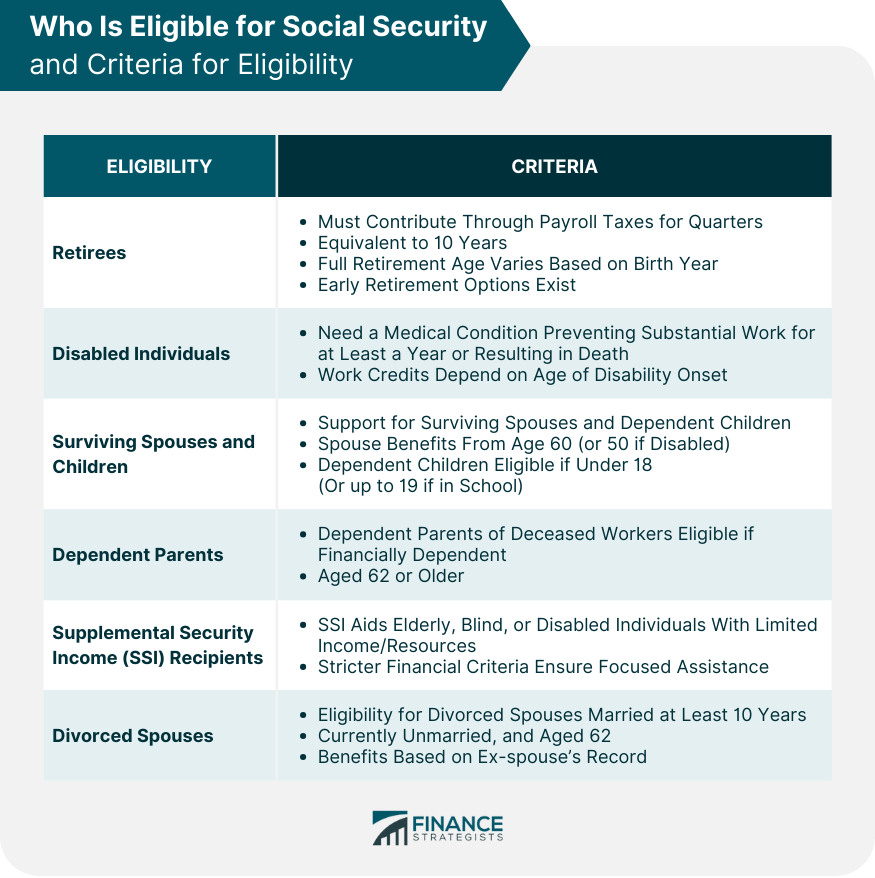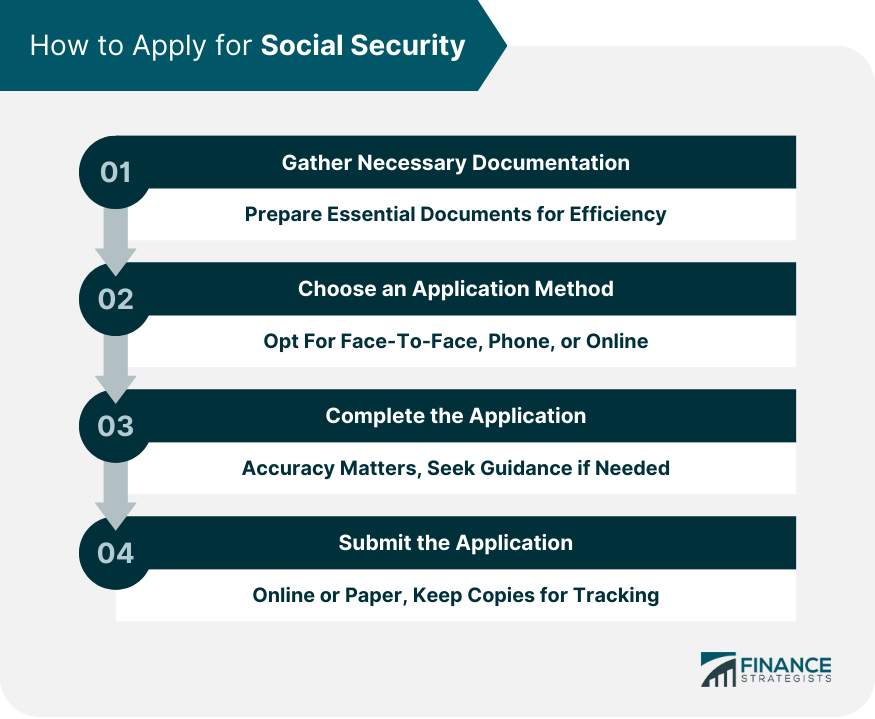Social Security, an integral facet of many nation's social welfare and insurance programs, acts as a financial safety net for individuals in various stages and circumstances of life. At its core, Social Security is designed to provide monetary benefits to individuals who are retired, disabled, or survivors of deceased workers. Funded by payroll taxes, this system provides economic stability to those in need due to aging, disability, or loss of income, offering protection against financial adversities. One of the most recognized beneficiaries of Social Security is retirees. After a lifetime of work and contribution to the Social Security system through payroll taxes, retirees are entitled to draw benefits once they reach a specified retirement age, which may vary based on factors such as the year of birth. The monthly benefit amount depends on the retiree's earnings record and the age at which they decide to start drawing benefits. Disabilities can disrupt the flow of income and impose significant financial burdens on individuals and their families. Recognizing this, Social Security provides disability benefits to individuals who have a medical condition expected to last at least one year or result in death. This ensures that they receive a consistent income stream, even when they're unable to work, easing the economic strain that often accompanies disabilities. The sudden demise of a family's breadwinner can plunge dependents into financial uncertainty. Social Security, with its survivor benefits, offers a lifeline in such cases. Surviving spouses, dependent children, and even dependent parents, in some cases, may be eligible to receive a portion of the deceased individual's Social Security benefits, ensuring that families have a source of income even in the face of loss. While less common, Social Security does provide for dependent parents of deceased workers. If a deceased worker's parent was dependent on them for at least half of their financial support and is aged 62 or older, they might be eligible for survivor benefits. Apart from the traditional Social Security benefits, the Supplemental Security Income (SSI) program caters to the financial needs of elderly, blind, or disabled individuals with little to no income. SSI ensures that these individuals can meet basic needs for food, clothing, and shelter, emphasizing the broader welfare objective of the Social Security system. The intricacies of Social Security benefits also extend to divorced spouses. If someone was married for ten years or more and is currently unmarried, they might be entitled to benefits based on their ex-spouse's earnings record. This recognizes financial interdependencies in long marriages, ensuring income access for those out of the workforce during their later years. Retirees form a significant portion of Social Security beneficiaries. To qualify, retirees must have contributed to the Social Security system through payroll taxes for a stipulated number of quarters, typically equating to 10 years of work. The age at which they can begin drawing full retirement benefits varies, often based on the year of birth. While early retirement options exist, commencing benefits before the full retirement age may lead to reduced monthly amounts. For disabled individuals, Social Security serves as a crucial financial support system. To qualify, they must suffer from a medical condition that not only prohibits them from engaging in substantial gainful activity but is also expected to last at least one year or result in death. Additionally, their past work contributions play a role. They should have a sufficient number of work credits, which depends on the age at which they became disabled. In the face of a worker's demise, Social Security extends support to surviving spouses and dependent children. A surviving spouse can start receiving benefits as early as age 60 (or age 50 if disabled) and at any age if caring for the deceased's child under 16. Dependent children, on the other hand, can receive benefits if they're unmarried and under 18, or up to age 19 if they are still attending elementary or secondary school full time. The umbrella of Social Security also shelters dependent parents of deceased workers. If a parent was financially dependent on their deceased child for more than half of their support and is 62 years or older, they may qualify for survivor benefits, ensuring they're not left destitute in the face of their child's untimely passing. The SSI program, distinct yet affiliated with the Social Security system, targets elderly, blind, or disabled individuals who have limited income and resources. Eligibility is determined by stringent financial criteria, ensuring that benefits reach those most in need. The program is designed to guarantee that beneficiaries can cover basic necessities such as food, clothing, and shelter. Social Security's reach also extends to divorced spouses, acknowledging the financial dynamics often present in long-term marital relationships. If one was married for at least ten years, is currently unmarried, and has reached age 62, they might be eligible for benefits based on their ex-spouse's earnings record, even if the ex-spouse hasn't started drawing benefits yet. This provides financial assurance, especially for individuals who might have stayed out of the workforce during their marital years. Initiating your Social Security application necessitates some preparation. It is pivotal to accumulate the essential documents beforehand to ensure a smooth and efficient process. Typically, you'll need your original birth certificate or proof of birth, a copy of your W-2 or self-employment tax return from the previous year, a Social Security card or a record of your number, proof of citizenship, or lawful alien status. If applicable, military discharge papers are also needed. By arranging these documents beforehand, you save time and reduce the risk of delays in processing. Modernization has brought about various methods to apply for Social Security. You can choose the traditional face-to-face meeting at a local Social Security office, call the Social Security Administration (SSA) and complete your application over the phone, or use the SSA's online platform. It's beneficial to weigh the pros and cons of each method. For instance, while the online platform offers convenience, elderly individuals or those not technologically adept might prefer a personal interaction. Filling out the application is a meticulous process, and attention to detail is crucial. Ensure that you provide accurate and complete information about your work history, dependents, and other necessary details. Remember, the information you provide determines the benefits you'll receive. It's a good practice to double-check the details and, if uncertain about any section, consult the SSA or seek guidance from trusted individuals or advisors. Once the application is completed, it's time for submission. If you're applying online, follow the prompts to submit digitally. For those choosing a paper application, you can either mail it or submit it in person at a local Social Security office. When submitting, ensure you keep copies of your application and accompanying documents. This not only serves as proof of submission but also aids in tracking and follow-up. Social Security, a fundamental part of social welfare programs, serves as a financial safety net for various life stages. It provides benefits for retirees, disabled individuals, and survivors of deceased workers. Funded through payroll taxes, it stabilizes finances in the face of aging, disability, or loss of income. The article addresses eligibility and application processes for different beneficiaries. Retirees must contribute via payroll taxes for a set number of quarters and reach a specific age. Disabled individuals need a medical condition inhibiting work and sufficient work credits. Surviving spouses, children, and dependent parents receive support. Supplemental Security Income caters to specific needs. Divorced spouses can qualify based on marriage duration. Preparation, documentation, method selection, and accurate application completion are vital for successful claims. Submission through online or in-person channels concludes the process, ensuring financial security in diverse life circumstances.Overview of Social Security
Who Is Eligible for Social Security?
Retirees
Disabled Individuals
Surviving Spouses and Children
Dependent Parents
Supplemental Security Income (SSI) Recipients
Divorced Spouses
Eligibility Criteria for Social Security Benefits
Retirees
Disabled Individuals
Surviving Spouses and Children
Dependent Parents
Supplemental Security Income (SSI) Recipients
Divorced Spouses

How to Apply for Social Security
Gather Necessary Documentation
Choose an Application Method
Complete the Application
Submit the Application

Conclusion
Who Is Eligible for Social Security? FAQs
Yes, you can apply for benefits as early as age 62. However, keep in mind that applying before your full retirement age will result in reduced monthly benefits.
Delaying your application can lead to increased monthly benefits due to the accumulation of delayed retirement credits. These credits stop accruing once you reach age 70.
Typically, it takes the SSA about six weeks to process an application. However, this can vary based on the complexity of the application and the volume of applications the SSA is handling at the time.
If you apply for Social Security benefits at age 65 or older, you are automatically enrolled in Medicare Part A. However, if you wish to enroll in Medicare Part B, you'll need to do so separately.
Yes, you can change your mind, but there are conditions. Within 12 months of receiving Social Security retirement benefits, you can "withdraw" your application. However, you must repay all the benefits you received. Once this is done, it's as if you never applied, allowing you to reapply in the future, potentially at a higher monthly benefit rate.
True Tamplin is a published author, public speaker, CEO of UpDigital, and founder of Finance Strategists.
True is a Certified Educator in Personal Finance (CEPF®), author of The Handy Financial Ratios Guide, a member of the Society for Advancing Business Editing and Writing, contributes to his financial education site, Finance Strategists, and has spoken to various financial communities such as the CFA Institute, as well as university students like his Alma mater, Biola University, where he received a bachelor of science in business and data analytics.
To learn more about True, visit his personal website or view his author profiles on Amazon, Nasdaq and Forbes.















